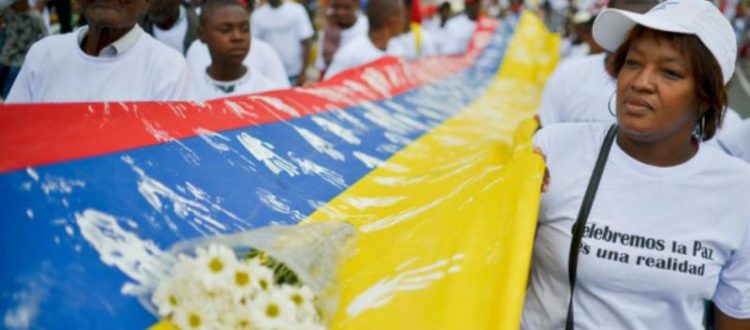LAWG: U.S. and Colombian Civil Society Organizations Call for Reinvigorating Peace Accord Implementation in Colombia
For Immediate Release:
July 23, 2020
Contact:
Antonio Saadipour | Program Assistant
asaadipour@lawg.org
LAWG: U.S. and Colombian Civil Society Organizations Call for Reinvigorating Peace Accord Implementation in Colombia
Washington, D.C. – Today, a group of U.S. and Colombian civil society organizations published Protect Colombia’s Peace, a report urging the U.S. government to adopt the full implementation of the peace accords as its principal diplomatic message for Colombia. It has been almost four years since the signing of the historic peace agreement that ended the Western Hemisphere’s longest running civil conflict, which claimed the lives of over 261,000 people and displaced almost 8 million Colombians. In the time since, more than 500 human rights defenders and social leaders have been killed for dedicating their lives to protecting Colombia’s fragile peace. The Venezuelan crisis is unfolding next door, and Colombia will not be able to provide refuge for Venezuelans if the peace accords unravel.
This joint U.S.-Colombian civil society initiative advocates for U.S. aid and stronger diplomacy to call on the Colombian government to implement the peace accord’s ethnic chapter and gender provisions, ensure justice for the victims of the armed conflict, protect human rights defenders, advance sustainable drug policy and rural reforms to reach Colombia’s small farmers and Afro-Colombian and indigenous communities, end abuses by the Colombian armed forces, and dismantle the paramilitary successor networks. The U.S. government’s diplomatic efforts in Colombia helped pave the way for peace, and this wise investment should not be wasted. The United States must boldly encourage full compliance with the peace accords before it is too late.
“Despite an outpouring of civic action by Colombians, many of them victims of the conflict, to make the peace accords real, the Colombian government’s actions have been limited and have failed to protect those risking their lives for peace,” said Lisa Haugaard, co-director of the Latin America Working Group (LAWG). “We need the Colombian government to recommit to peace–and for the next U.S. administration to make Colombia’s peace its priority.”
“The lack of a strong message from the United States government about the need to dismantle paramilitarism and break the Armed Forces’ ties with these groups has led various sectors in the Colombian government and powerful sectors of society to believe that the employment of paramilitaries in the internal conflict continues to be useful, and that is why they have not allowed the Security Guarantees Commission to implement the plan to dismantle these groups, three years after it was created. A clear message from the U.S. government demanding the fulfillment of the commitment to dismantle these groups would open the way for the consolidation of peace and tangible results in the protection of social leaders,” indicated Alberto Yepes, coordinator for the Observatory of Human Rights and Humanitarian Law at Colombia – Europe – United States Coordination Network (CCEEU).
“The global pandemic and George Floyd protests have further exposed the need to address long standing racial and social inequalities in the region. With the peace accord, Colombia has a framework that, if implemented correctly by applying the ethnic chapter, could make a huge dent in building an inclusive society, a more democratic and egalitarian society,” said Gimena Sánchez-Garzoli, director for the Andes, Washington Office in Latin America (WOLA).
“Only 7 percent of the ethnic chapter of the peace accords has been implemented. As a result, the conflict in Afro-Colombian and indigenous territories continues to grow and state presence is weak,” said Ariel Palacios, representative of National Afro-Colombian Peace Council (CONPA).
“The implementation of point one of the peace agreement on integral rural reform is crucial for peace in Colombia. Colombia’s poor farmers have been struggling to achieve these reforms for many years,” noted a group of Colombian-American organizations, including Cristina Espinel and Julio Idrobo, Colombia Human Rights Committee, Washington, DC; Angel Patiño, Colombia Grassroots Support, New Jersey; Julio Bedoya, Movement for Peace in Colombia, New York; and Elizabeth Castañeda, Arraigo, New York.

